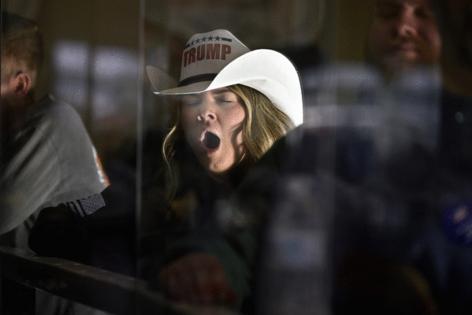Commentary: We should aim to be boring, at least when it comes to politics
Published in Op Eds
American politics is anything but boring. That’s not a good thing. A stable, even dull political order is a worthy goal. Just as the Founders ditched a political order that seemed to create, rather than solve, crises, we should look for ways to reduce chaos, turmoil and incompetence.
Chaos — real or imagined — creates excuses for politicians to advance extreme proposals. Amid the Korean War, President Harry Truman attempted to seize control of most of the country’s steel mills. Congress had frequently refused to grant the executive the authority to take such drastic action. Truman persisted, and it’s hard to blame him. An ongoing conflict puts incredible pressure on the president to do all that they think is necessary to secure victory (and maintain the public’s support).
Thankfully, the Supreme Court used an expedited process to hear a legal challenge to Truman’s aggressive act and denied the seizure. Ideally, though, such a rush job would not be required. Conflicts are unavoidable. Clashes between the branches, however, can be reduced by increasing deliberation among key officials and investing in scenario planning for bad outcomes.
Turmoil — real or imagined — breeds resentment that chips away at our sense of community. Political instability marked by swings between extreme partisan positions creates a sense that the government is incapable of focusing the needs of the people. Frustration arising from that inattention would ideally unify everyone to achieve mutual goals, but greater partisanship is usually what comes from gridlock. People seeking certainty turn to the party that promises to deliver just that. It comes as no surprise that researchers analyzing recent economic downturns have found that “group polarization, rising inequality, and economic decline may be strongly connected.” Stemming any of those sources of turmoil is a step in the right direction. For instance, identifying, electing and reelecting folks willing to work across party lines can reduce excessive polarization. There’s a reason the history books celebrate politicians like Sen. John McCain, who found ways to collaborate with Democrats and Republicans.
Incompetent governance— real or imagined — gives private interests a chance to accumulate excessive power by usurping public authority. When the government appears ineffective, private actors — be they corporations, oligarchs or interest groups — are quick to step in and fill the vacuum. The result is a system where public resources are funneled toward private gain, and public officials become beholden to those who wield economic power. This erosion of public trust in government competency opens the door for corruption, cronyism and regulatory capture, all of which deepen public disillusionment.
Worse still, when government fails to deliver basic services or respond to crises, the people turn to private solutions that are often inequitable and undemocratic. To prevent incompetence from empowering private interests, we must double down on investing in building and maintaining robust public institutions that can effectively serve the common good.
All these concerns are not new. In fact, chaos, turmoil and incompetence are why early Americans ditched the Articles of Confederation for the Constitution. Victory over the British did not result in immediate tranquility. Mobs, county committees and loyalists to the crown all made governing difficult. Obstinate states, unwilling or unable to contribute to national efforts, likewise hindered a smooth start to the new country. This status quo was unacceptable to the Founders. They were quick to see that so much unrest could undermine their bold project before it even reached its teenage years. To accelerate the maturation of the nation and to increase the odds of its success, James Madison and others designed a system to quell political winds from blowing in trouble.
We can and should heed the lesson learned by our forefathers. Simple steps can go a long way toward making politics a little more boring. To start, let’s shorten the election period. The seemingly endless campaign cycle diminishes the odds of officials having the time and energy to focus on the task of actually governing. Another easy step would be to remove cameras from the Senate and House floor — freed from the pressure to try to make speeches go viral, legislators might engage in more substantive conversations. These are just a couple ideas — many more should be explored. A more boring America is possible and desirable.
____
Frazier is an assistant professor at the Crump College of Law at St. Thomas University and a Tarbell fellow.
____
©2024 The Fulcrum. Visit at thefulcrum.us. Distributed by Tribune Content Agency, LLC.




























































Comments